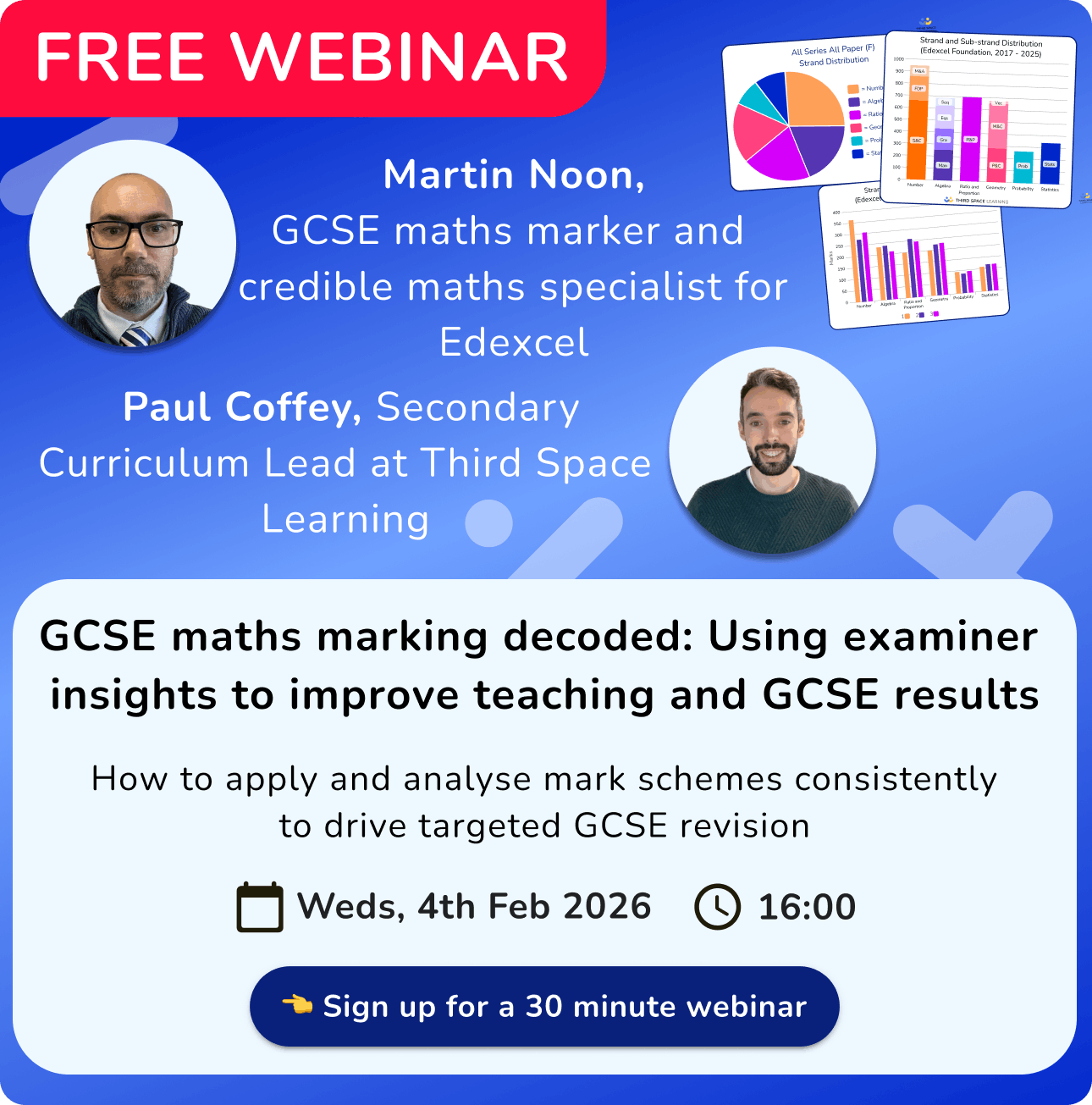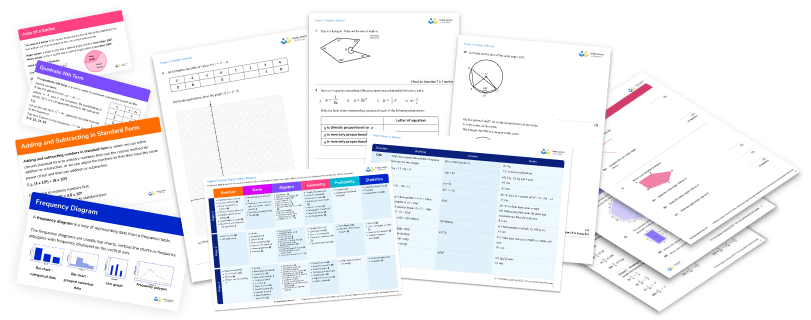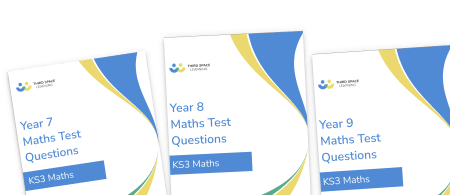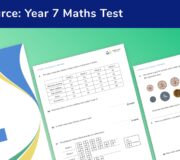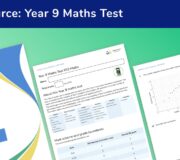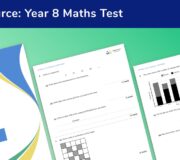Free KS3 Maths Worksheets: Teacher Tested Resources For Years 7, 8 and 9
Download these free KS3 maths worksheets for Years 7, 8 and 9 and save yourself hours of planning time, finding or creating your own maths worksheets.
The printable, curriculum-aligned resources we’ve included here cover all major KS3 maths topics including number, algebra, geometry, statistics and ratio. They’re ideal for lesson starters, homework, retrieval practice or targeted intervention.
Each worksheet comes with:
- Clear, scaffolded questions that build confidence through practice
- Full answers and teacher guidance
- Options for independent or guided use
Over 75,000 UK secondary teachers already use Third Space Learning’s maths worksheets for lesson starters, homework, and targeted practice. All the maths resources include detailed answer sheets and are designed by experienced secondary maths teachers in England.
Every worksheet complements the approach used in Skye, our voice-based AI maths tutor. Together, they provide consistent, one-to-one learning support – in class, at home, or during interventions.
Years 7, 8 and 9 Maths Tests
Download your free bundle of KS3 maths tests for years 7, 8 and 9 to assess students’ understanding and any misconceptions at KS3.
Download Free Now!Why KS3 maths worksheets matter
By the time pupils reach Key Stage 3, maths becomes more abstract and cumulative. Each new concept — whether algebraic notation, probability, or geometric reasoning — depends on secure understanding of earlier foundations.
At KS3, the mathematics curriculum builds upon the foundations established in primary school while carefully preparing students for the rigours of GCSE mathematics. This three-year journey transforms Year 7 students mastering basic operations and simple problem-solving into Year 9 mathematicians ready to tackle more complex problem-solving maths questions and challenges in preparation for KS4.
At the heart of this progression are three essential skills:
- Fluency and automaticity – rapid recall and efficient calculation
- Mathematical reasoning – explaining and justifying solutions
- Problem-solving – applying concepts in unfamiliar contexts
KS3 maths worksheets provide teachers with a ready-made bank of topic-specific questions, saving preparation time while supporting these core functions:
- Practice and consolidation: Structured opportunities to apply concepts like solving equations, working with fractions, and understanding standard form. Regular practice embeds foundational skills.
- Assessment: Teachers can gauge understanding of key topics and identify students needing additional support through targeted worksheet tasks.
- Independent learning: Well-designed worksheets allow students to work at their own pace, with questions gradually increasing in difficulty from basic operations to complex problems involving ratio, geometry, and statistics.
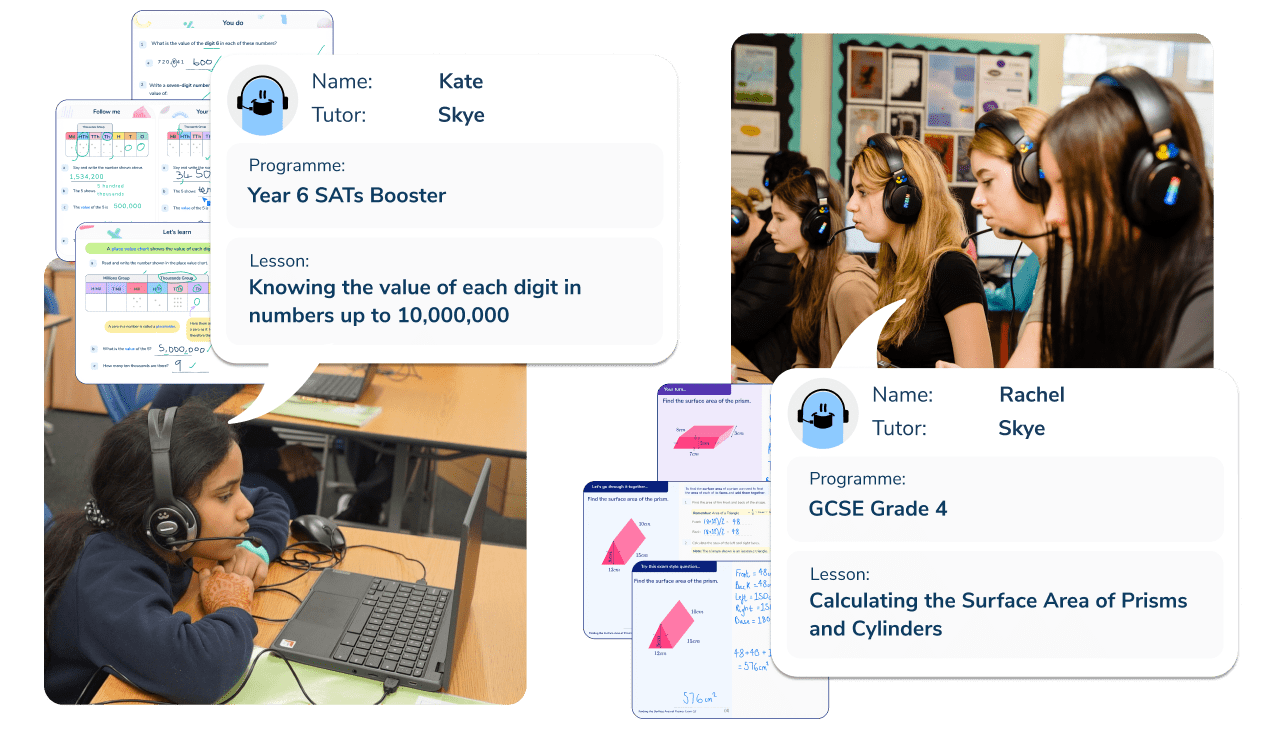
Meet Skye, the voice-based AI tutor making maths success possible for every student.
Built by teachers and maths experts, Skye uses the same pedagogy, curriculum and lesson structure as our traditional tutoring.
But, with more flexibility and a lower cost, schools can scale online maths tutoring to support every student who needs it.
Watch Skye in actionWhat to know about these KS3 maths worksheets
These maths worksheets are not generic or AI-generated resources – they’re written, tested and refined by real teachers with many years of teaching experience. Every question and example reflects the same research-based pedagogy that underpins Third Space Learning’s tutoring and AI maths support.
Here’s what makes them effective and distinctive:
1. Built on mastery, not memorisation
Each worksheet follows a small steps approach. Students first explore simple concepts, then apply them in varied and complex contexts. This ensures deep understanding rather than rote learning.
2. Sequenced to match curriculum progression
The topics are carefully ordered so pupils can build fluency over time — from place value and algebraic manipulation in Year 7 to trigonometry and data analysis by Year 9.
3. Designed for flexibility
Teachers can use them as:
- Lesson starters or practice activities
- Engaging homework or revision tasks
- Targeted intervention activities
- Diagnostic tools to identify misconceptions
4. Created from a decade of tutoring insights
Our worksheets draw on over 2 million hours of one-to-one tutoring and the diagnostic data behind it. This means every task is designed to pre-empt common misconceptions and reinforce conceptual links between topics.
“We’ve learned that retrieval and reasoning are most powerful when combined. That’s why our KS3 worksheets include reflection prompts and mixed-topic reviews, not just repetitive drills.”
— Paul Coffey, Secondary Maths Curriculum Lead, Third Space Learning
5. Ready to use
All the maths worksheets are:
- Free to download
- Easy to print or share digitally
- Suitable for interactive whiteboards or self-paced study
- Fully aligned with the DfE’s Key Stage 3 mathematics programme of study
And because they share the same curriculum framework as Skye, our AI maths tutor, teachers can seamlessly move from worksheet-based practice to one-to-one spoken tutoring within the same learning sequence.
What teachers say about these worksheets
“The worksheets are scaffolded nicely. The diagnostic tools help me assess whether the class are ready for the worksheet as I have it up on the board after explaining the theory and some examples of calculations.” Maths Teacher, South-East
“I have been really impressed with the quality of resources available through Third Space Learning and have been using them in my maths classes.” Darren Madourie, Holte School
“Third Space Learning has fantastic resources. Everything that comes out of Third Space Learning is my go to. If I need something to fit into my curriculum, I will go and have a look at what Third Space Learning has produced. Their resources are just incredible, both for students, for staff and the online sessions.” Stacey Atkins, Maths Director, Outwood Grange Academies Trust
How to use these KS3 maths worksheets
Whether you’re introducing new content, revisiting prior learning, or targeting specific gaps, these worksheets help you structure intelligent practice while saving valuable planning time.
In the classroom
- Lesson starters or warm-ups – Begin with short retrieval tasks from topics pupils have already covered, encouraging recall and fluency.
- Guided group work – Use worksheets alongside manipulatives or visual models to strengthen conceptual understanding.
- Support your curriculum: Provide your students with opportunities for intelligent practice to develop their understanding of a given topic.
- Differentiated tasks – Choose scaffolded or stretch questions to meet the needs of mixed-ability classes.
- Low-stakes assessment – Quickly gauge understanding with end-of-section questions and answer sheets.
For homework or revision
- Independent consolidation – Assign one sheet per topic to reinforce understanding.
- Pre-teaching tasks – Introduce upcoming content to support pupils who benefit from advance exposure.
- Cumulative review – Combine questions from different topics for spaced retrieval and mastery over time.
For targeted intervention
- Small-group support – Use worksheets to address gaps identified through formative assessment or adaptive platforms.
- Catch-up programmes – Build structured, progressive sequences that help learners move from procedural recall to reasoning.
“Our most effective interventions use worksheets as conversation starters – not just exercises. They help teachers diagnose thinking and prompt pupils to explain their reasoning.”
— Paul Coffey, Secondary Maths Curriculum Lead, Third Space Learning
All worksheets can be printed, shared digitally or projected for interactive discussion. They’re equally useful for supply teachers or cover, ensuring continuity of learning even when staffing is tight.
When worksheets work best – and when students need more:
Worksheets excel at building fluency through repeated practice. However, when students make the same mistakes repeatedly, they often need immediate, adaptive feedback.
That’s where Skye comes in – our AI maths tutor identifies misconceptions in real-time and adjusts the lesson automatically, providing the personalised and responsive support that static worksheets can’t offer.
“Skye has been trained with the same pedagogy as our traditional tutors, using lessons and strategies honed over 10 years of experience. But now schools also have the flexibility they’ve never had before. It’s how we make individualised support sustainable.” Candida Crawford, Head of Education, Third Space Learning
Learn more about using Skye for bespoke intervention in your school
Free KS3 maths worksheets available to schools
Here we’ve brought together a selection of the KS3 maths resources and also GCSE maths worksheets of most use to Heads of KS3 maths and Year 7, 8 or 9 maths teachers. If you’re looking for more you can explore all our resources in our library of secondary maths resources.
You may also find the KS3 maths questions in the following articles useful:
- The 12 Divisibility Rules Students Should Know By Secondary School
- Divisibility Rules Worksheet
- 24 Fraction Questions And Answers
- 14 Long Division Questions
- All About Ratio Tables
Daily fluency and recall: Fluent in Five maths worksheets and slides
Learners must build fluency to develop automaticity. Third Space Learning’s secondary maths experts understand that daily retrieval practice of the key maths skills needed for KS3 helps build fluency and support retrieval. That’s why they’ve developed Fluent in Five for Years 7, 8 and 9 alongside a wealth of maths worksheets for practise and consolidation.
5 questions per day, 5 days per week with questions becoming increasingly complex as the week progresses. Questions are focused on retrieval to allow learners to develop important mathematical skills.
Each year group has 6 half terms’ worth of worksheets and PowerPoints to provide flexibility over how you use these worksheets. Weekly discussion points to help your learners explore each topic in detail.

Download KS3 maths worksheets by topic
The worksheets below include resources from both our KS3 and GCSE collections. We’ve selected GCSE worksheets that cover KS3 curriculum content – perfect for consolidation and for stretching higher-attaining students.
Using GCSE worksheets at KS3: Focus on the early-to-middle sections of each worksheet. The final questions often cover GCSE-only content, so simply skip these sections when working with KS3 classes. All resources include full answers to help you select appropriate questions.
1. Number worksheets
Success in mathematics begins with a solid grasp of number and quantity and operations. The beauty of number work at KS3 lies in how it connects seemingly distinct concepts such as fractions (½), decimals (0.5), and percentages (50%) and transforms them from separate ideas into different expressions of the same value.
These worksheets provide computational fluency through structured practice from basic operations and multiplication through to standard form and percentage problems. Each worksheet includes comprehensive answers in PDF format.

2. Algebra worksheets
At Key Stage 3, algebra transforms from mysterious letters and symbols into a powerful tool for solving problems and describing patterns. Students learn to simplify expressions, solve equations, work with sequences, and graph linear functions.
These carefully structured worksheets help students develop both technical proficiency and conceptual understanding. Each resource includes complete answers with worked solutions in PDF format, and selected topics include video explanations of key methods.

3. Ratio and Proportion worksheets
At Key Stage 3 ratio and proportion bridge numerical fluency and real-world applications – from scaling recipes to understanding rates and analysing data patterns. Students learn to simplify ratios, use unitary methods, and apply proportional relationships in practical contexts.
These worksheets provide structured practice building from simple ratio problems to complex proportion calculations. All resources include detailed answers in PDF format showing full working, helping students understand the complete solution process.

4. Geometry and Measurement worksheets
Geometry at Key Stage 3 develops spatial reasoning through work with shapes, angles, transformations, and measurements. Students calculate perimeters, areas and volumes, apply Pythagoras’ Theorem, and explore properties of angles including parallel lines and polygons.
Regular practice with these visual problems helps students build spatial awareness alongside technical accuracy. Each worksheet includes comprehensive answers with diagrams in PDF format, and selected geometry topics include video walkthroughs showing construction techniques.

5. Probability worksheets
Probability at KS3 moves students from simple likelihood concepts to sophisticated calculations using probability trees, Venn diagrams, and sample spaces. Students learn to use the probability scale, calculate combined events, and interpret results in real-world contexts.
These worksheets develop both calculation skills and conceptual understanding. All resources include complete answers in PDF format with full working shown, helping students understand probability reasoning.

6. Statistics worksheets
Statistics at KS3 empowers students to understand and interpret the data-rich world around them. From analyzing social media trends to understanding climate data, statistical literacy has become an essential skill for informed decision-making. Students learn to calculate averages, plot and analyse graphs including scatter graphs, understand sampling methods, and interpret statistical information critically.
These worksheets provide practice processing and interpreting data. Each resource includes comprehensive answers in PDF format showing calculation methods and graph interpretations.
Through regular practice with these materials, students develop both the technical skills to process data and the critical thinking abilities to interpret and question statistical information effectively.

Final thoughts
KS3 is where students either build mathematical confidence or begin to disengage. The difference often lies in whether they get enough practice at the right level, combined with timely support when they struggle.
These worksheets give teachers a reliable, curriculum-aligned resource for daily practice. But they’re most effective when used as part of a broader strategy – one that recognises when worksheet practice is enough, and when students need more support.
For students who continue to struggle despite regular worksheet practice, explore how Skye’s adaptive one-to-one tuition can provide the bespoke support they need.
READ MORE:
- Why SSDD Problems Are Such An Effective Tool To Teach Problem Solving At KS3 & KS4
- 25 Fun Maths Problems For KS3
- How To Make Fun, Engaging, And Curriculum-Focused KS3 Maths Problems
- The 24 Best Free KS3 Maths Games For Engagement
- Supercharge Your Maths Teaching with ChatGPT & LLMs: Prompts, Tips, and Pitfalls
FAQs about KS3 maths worksheets
Yes – all worksheets are free to download and print for classroom or home use.
Every worksheet comes with full answers and worked solutions in PDF format.
Yes – our library covers Years 7, 8 and 9 with progressive difficulty.
Absolutely. They’re designed for independent or guided revision and build towards GCSE readiness.
DO YOU HAVE STUDENTS WHO NEED MORE SUPPORT IN MATHS?
Skye – our AI maths tutor built by teachers – gives students personalised one-to-one lessons that address learning gaps and build confidence.
Since 2013 we’ve taught over 2 million hours of maths lessons to more than 170,000 students to help them become fluent, able mathematicians.
Explore our AI maths tutoring or find out how online maths tuition could support students in your school.
